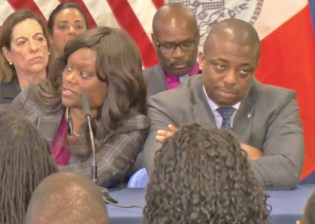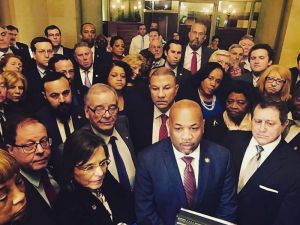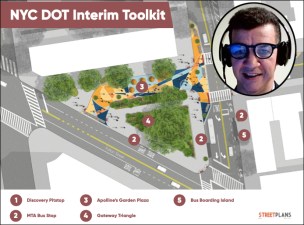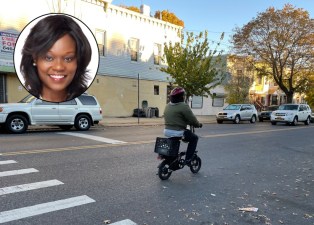All Aboard! Now Even Rodneyse Bichotte Says She Supports Congestion Pricing!
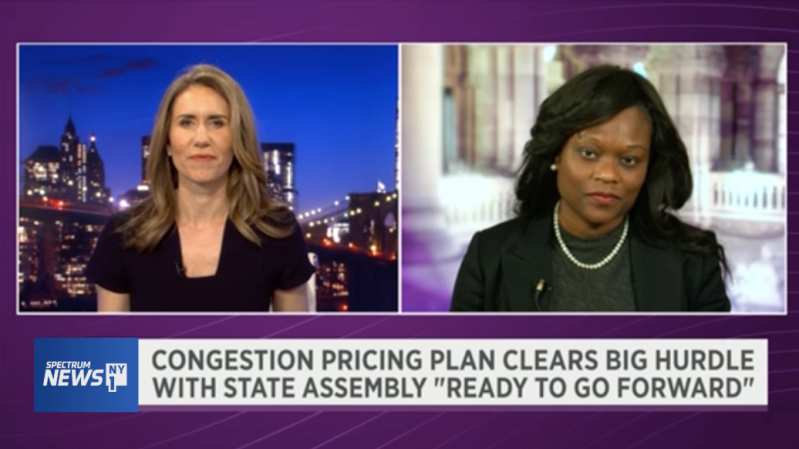
One of congestion pricing’s highest-profile opponents has done an about-face and now supports the tolling plan, just two days after issuing a scathing takedown calling the proposal a tax on the poor.
Assembly Member Rodneyse Bichotte went on NY1’s “Inside City Hall” to explain her newfound support for the idea of tolling drivers to raise money for the beleaguered transit system — a proposal she initially said she could not support because she did not trust Gov. Cuomo’s pledge that the money generated would go to a transit “lockbox.”
“I was against congestion pricing,” she said on Tuesday night. “My concern revolved around the accountability and transparency and making sure the funding actually raised would actually go to fixing the MTA. … I did not want this to be just another way to generate revenue from working class and low-income residents of New York City.”

Pressed by the show’s host, Grace Rauh, as to whether she will now vote in favor of congestion pricing, Bichotte suggested that she would.
“Many of my concerns were addressed,” she said, citing meetings with MTA President Pat Foye and Assembly Speaker Carl Heastie, who did not cite Bichotte when he declared on Monday night that he had lined up the votes he needed.
Bichotte added that she is now confident that the congestion pricing toll revenue would indeed go into an MTA lockbox.
But the Assembly Member did raise the specter that Albany lawmakers will create so many exemptions to the tolls that the program might not raise enough revenue to succeed in generating the expected $1 billion.
“I was concerned about [tolling] seniors, people with disabilities and low income,” she said. “[So] we are talking about an exemption for low-income. There is talk about [exempting people making] $60,000 or less.”
Bichotte suggested that $60,000 — which is nearly double the median income in her Flatbush district — might not be high enough.
“We do have members with eight or seven children, and what happens to those who make $70,000 or $80,000?” she asked.
Bichotte added that the legislature would continue discussions of exemptions after it passes congestion pricing.
“We are told that these things will be addressed at a later time,” she said, adding that she hopes to create more room for exemptions by pushing for passage of a millionaire’s tax and a return of the commuter tax.
It is unclear why there will be exemptions of any kind for congestion pricing tolls, given that there are no such carveouts for any existing tolls, such as for the Queens-Midtown Tunnel or the George Washington Bridge. Congestion pricing would only charge a toll on drivers entering Manhattan’s central business district — an area to which there are abundant public transit options.
As such, activists were concerned:
“Congestion pricing has to be robust enough to raise billions to fix the subway while getting bus riders moving again,” said Danny Pearlstein of Riders Alliance. “It can’t be allowed to die a death of a thousand exemptions. Whether it’s the legislature deciding, or some other body once the budget is done, riders are looking for a strong plan that delivers modern, reliable transit and less traffic.”
Transportation Alternatives’ spokesman Joe Cutrufo also pointed out the irony of carveouts:
Congestion pricing has the potential to fix the transit system and make our streets saner and safer. In a city with ancient subway infrastructure, abysmally slow buses, and chronic gridlock, why would anyone want to water down a plan intended to fix those things? Compared to those who ride transit, the number of New Yorkers who commute by car into Manhattan is quite small, and on average, car commuters earn twice as much as transit commuters. So when lawmakers talk about wanting carve-outs, they’re putting the wishes of a comparatively small group of people ahead of the transit-riding majority.
But regardless of the talk of exemptions, Bichotte’s conversion to congestion pricing supporter comes after nearly a week of criticism of her initial position. Before Tuesday, Bichotte had said that she saw congestion pricing as a tax on low-income drivers, even though only a tiny fraction of her constituents drive into the central business district regularly — and those who do tend to be far wealthier than their transit-riding neighbors.
